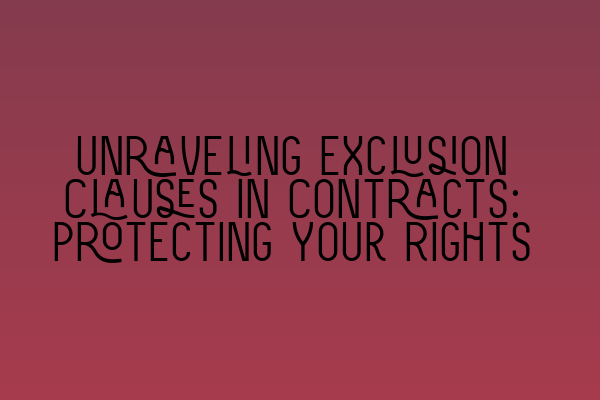Unraveling Exclusion Clauses in Contracts: Protecting Your Rights
In the realm of contract law, exclusion clauses play a crucial role. These clauses aim to limit or exclude liability for certain types of losses or damages that may occur during the course of a contractual relationship. While exclusion clauses may seem like legal jargon, understanding their implications is essential to protect your rights and ensure fairness in any contractual agreement.
At SQE Contract Law, we believe in empowering individuals with the knowledge and understanding required to navigate the complexities of contractual relationships. In this blog post, we will unravel the intricacies of exclusion clauses, shed light on their significance, and provide you with valuable insights on how to safeguard your rights.
What Are Exclusion Clauses?
Exclusion clauses are contractual provisions or terms that seek to limit or exclude liability for specific types of losses, damages, or events. These clauses are commonly found in a wide range of contracts, including commercial agreements, consumer contracts, and employment contracts. They serve the purpose of allocating risk between the parties involved in the contract.
Exclusion clauses can take many forms, including disclaimers, limitations of liability, indemnity clauses, or exclusion of certain types of damages. Their ultimate goal is to define the extent to which one party can be held responsible for any loss or damage suffered by the other party.
Understanding the Legal Effect of Exclusion Clauses
While exclusion clauses are widely used in contracts, their validity and enforceability depend on certain legal principles. The law recognizes that there is often a power imbalance between the parties involved in a contractual relationship. Consequently, the courts apply strict scrutiny to exclusion clauses to ensure that they are fair, reasonable, and clear.
There are three main ways in which exclusion clauses can come under scrutiny:
1. Incorporation: For an exclusion clause to be valid, it must be properly incorporated into the contract. This means that the party seeking to rely on the exclusion clause must have taken reasonable steps to bring it to the attention of the other party before or at the time of entering into the contract. Failing to do so may render the exclusion clause ineffective.
2. Interpretation: Courts interpret exclusion clauses strictly against the party seeking to rely on them. Any ambiguity or uncertainty in the wording of the exclusion clause is usually resolved in favor of the party seeking compensation. This ensures that the party with lesser bargaining power is not unfairly deprived of their rights.
3. Unfair Contract Terms: Certain exclusion clauses may be considered unfair under legislation such as the Consumer Rights Act 2015. Unfair contract terms are those that cause significant imbalance in the parties’ rights and obligations, to the detriment of the consumer or the party with lesser bargaining power. Such terms may be deemed unenforceable, and consumers may still have rights and remedies despite the inclusion of the exclusion clause.
Protecting Your Rights
To protect your rights when dealing with exclusion clauses, it is important to take the following steps:
1. Read and Understand the Contract: Carefully read and understand the terms of the contract, paying particular attention to any exclusion clauses. Seek clarification from the other party or consider seeking professional legal advice if needed.
2. Negotiate and Seek Amendments: If you are unhappy with any exclusion clause, negotiate with the other party to amend or remove it. Remember, contracts are often negotiable, and parties may be willing to make reasonable adjustments to ensure fairness.
3. Consider Alternatives: If the other party refuses to amend or remove a particularly harsh exclusion clause, consider whether it is worth entering into the contract. It is crucial not to compromise your rights excessively, especially in high-stakes agreements.
4. Be Aware of Your Legal Rights: Educate yourself on the relevant laws and regulations that govern your contractual relationship. This will empower you to identify any unfair or unenforceable exclusion clauses and seek appropriate remedies if necessary.
Conclusion
Exclusion clauses are an integral part of contract law, often serving as a means to allocate risk between parties. However, it is crucial to understand their implications and ensure that they are fair, reasonable, and properly incorporated into the contract. By taking the necessary precautions and seeking professional legal advice when needed, you can protect your rights and ensure a fair contractual agreement.
At SQE Contract Law, we specialize in providing comprehensive guidance and support related to contract law and other legal areas. If you require further assistance or have any questions, do not hesitate to contact our team of expert solicitors. Together, we can navigate the intricacies of exclusion clauses and safeguard your rights.
Related Articles:
– SQE 1 Practice Exam Questions
– SQE 1 Practice Mocks FLK1 FLK2
– SQE 2 Preparation Courses
– SQE 1 Preparation Courses
– SRA SQE Exam Dates
